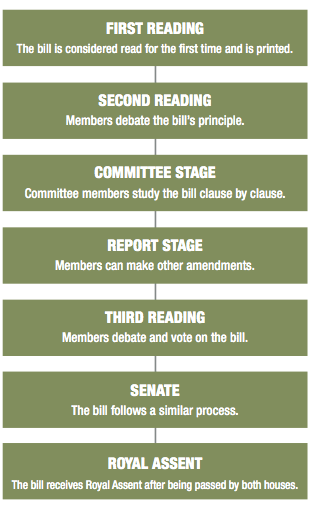At Work in Committees
Committee work is an important part of Members' duties. It is here that Members study proposed legislation, amend bills and examine departmental spending plans. Committees can initiate their own inquiries or study issues referred to them by the House. These issues relate to areas of public policy such as the environment, defence and health.
Legislative Process

Committees can ask interested parties to submit briefs and may travel across Canada or abroad to gather information and hear from individuals and groups with an interest in the subject. At the conclusion of a study, the committee may present a report to the House with its views and recommendations.
The House of Commons has 24 standing committees, each consisting of 12 Members, as well as 2 standing joint committees.
How Committee Members Are Selected
To determine membership on House committees, lists of candidates are prepared by the party whips. These lists are submitted to the Standing Committee on Procedure and House Affairs, which submits a final list to the House of Commons for approval.
Committee representation is based on party standings in the House of Commons. Most standing committees are chaired by members of the governing party. Each chair is assisted by a first vice-chair, who is a member of the Official Opposition, and a second vice-chair, who is a member of an opposition party other than the Official Opposition.
There are exceptions to this rule. The following are standing committees that are chaired by a member of the Official Opposition with a first vice-chair from the governing party and a second vice-chair from an opposition party other than the Official Opposition:
- Public Accounts
- Access to Information, Privacy and Ethics
- Status of Women
- Government Operations and Estimates
- Scrutiny of Regulations.
Committee Studies
STANDING COMMITTEES OF THE HOUSE OF COMMONS FOR THE 39TH PARLIAMENT
Aboriginal Affairs and Northern Development
Access to Information, Privacy and Ethics
Agriculture and Agri-Food
Canadian Heritage
Citizenship and Immigration
Environment and Sustainable Development
Finance
Fisheries and Oceans
Foreign Affairs and International Development
Government Operations and Estimates
Health
Human Resources, Social Development and the Status of Persons with Disabilities
Industry, Science and Technology
International Trade
Justice and Human Rights
National Defence
Natural Resources
Official Languages
Procedure and House Affairs
Public Accounts
Public Safety and National Security
Status of Women
Transport, Infrastructure and Communities
Veterans Affairs
STANDING JOINT COMMITTEES
Library of Parliament
Scrutiny of Regulations
In addition to studying legislation, committees investigate many subjects. Over the past year, House of Commons committees held a total of 1,087 meetings and produced 190 committee reports.
Visit the Parliament of Canada Web site at www.parl.gc.ca for a complete list of these reports (available on the respective committee's page or on the global committee page).
The following partial list offers a glimpse of the range of subjects studied by committees:
- the role of a public broadcaster in the 21st century
- taxation
- small craft harbours
- Canada's presence in Afghanistan
- prescription drugs
- the economic security of women
- Canada's trade and investment relations with the Arab states, the European Union and Southeast Asia
- Witness Protection Program
- the Personal Information Protection and Electronic Documents Act
- refugees
- counterfeiting and piracy of intellectual property
- the vitality of official language minority communities.
Unique Characteristics of Committee Work
By virtue of their smaller size relative to the Chamber, committees allow Members to examine complex matters in detail and help to develop their expertise in specific areas of public policy. Committees are also a forum where Members can hear from experts on a range of topics and have this information placed on the public record.
HOUSE COMMITTEE STATISTICS FOR 2007-2008
Total number of meetings: 1,087
Total number of sitting hours: 1,840
Total number of witnesses: 3,060
Total number of reports: 190
A committee is not a final decision-making body. When it has finished considering a matter, it presents its findings and recommendations in a report to the House. Committees can influence policies and decision-making, and their reports may include a request that the government provide a comprehensive response within 120 days.
Organization of Committees
OUTREACH PROFILE
Library of Parliament
In addition to the valuable support it provides to the Senate and the House of Commons, the Library of Parliament is an important resource for all Canadians. Accessing more than 17 linear kilometres of materials in the Library's collection, staff respond to hundreds of requests for information and reference services daily from Members' offices, as well as from parliamentary officials, committees and associations. Through its public programs, the Library also provides citizens with information and services concerning Parliament, such as programs and products for teachers, print and electronic publications, guided tours, exhibits and on-site and e-commerce parliamentary boutiques.
Every standing committee is led by a chair and two vice-chairs. The chair is the presiding officer and spokesperson, and casts a vote only when there is a tie. The chair's duties include maintaining order and decorum and deciding on questions of order and procedure, as well as leading the work of the committee.
The committee clerk is a non-partisan and independent officer who serves all members of a given committee. As an expert in the rules of the House of Commons, the clerk may be asked to advise on procedural questions. The clerk is the coordinator, organizer and liaison officer for the committee and is in frequent contact with members' staff, government departments and members of the public.
TYPES OF COMMITTEES
Standing Committee
A permanent committee that oversees the activities of government departments and studies proposed legislation and estimates.
Special Committee
Appointed by the House of Commons to inquire into specific matters; a special committee ceases to exist after it presents a final report to the House.
Legislative Committee
Studies a bill referred to it by the House and reports it back to the House with or without amendments. A legislative committee ceases to exist once the committee has submitted its report to the House.
Joint Committee
Consists of a proportionate number of Senators and Members of the House of Commons.
Subcommittee
A standing committee may delegate any or all of its powers to a subcommittee, except the power to report directly to the House of Commons.
OUTREACH PROFILE
United Way

Every year, the House of Commons organizes fundraising events to support the United Way campaign. In 2000, employees contributed more than $40,000-surpassing their objective by 15%. In 2005, employees more than doubled that sum, raising $84,872 in contributions. And in 2007, this campaign raised $109,479 in contributions.
The organizers of the United Way campaign reveal the partial amount collected in 2007 to the Clerk.
Photo: © House of Commons

Hansard is the official report of parliamentary debates. It is posted online on the Parliament of Canada Web site at www.parl.gc.ca, and published in hard-copy format.



